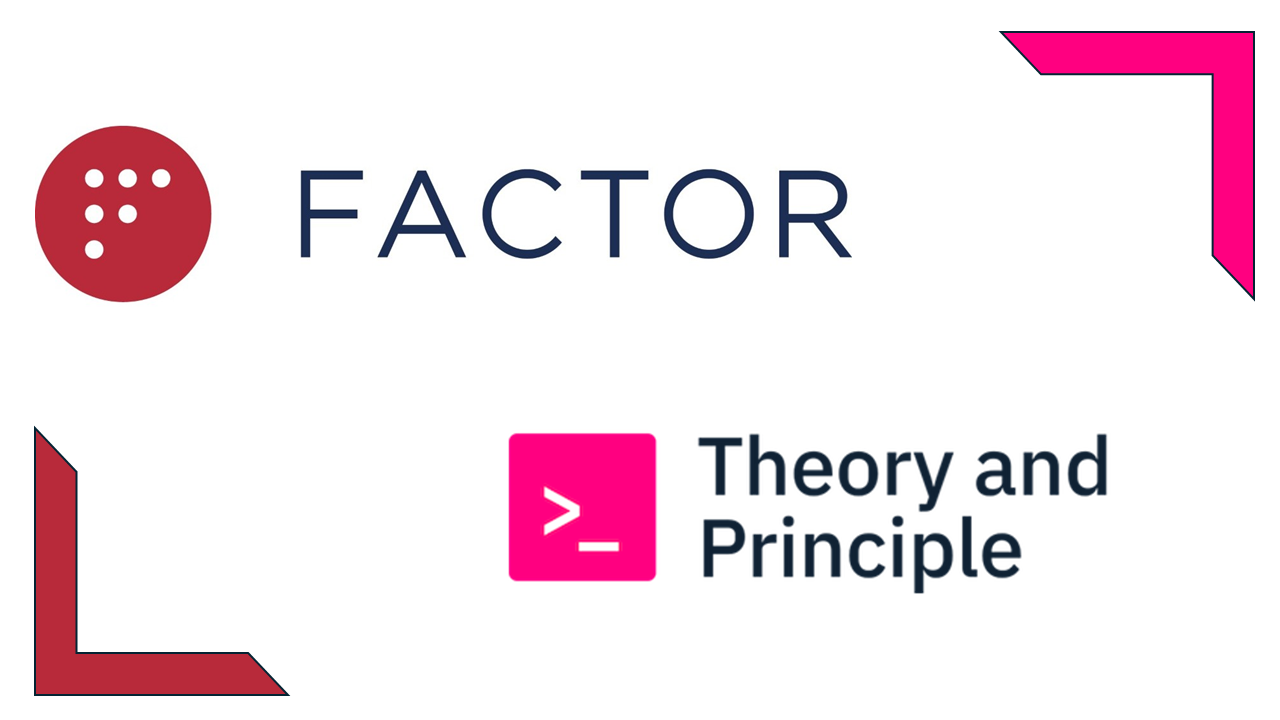Factor, a managed services company that describes itself as a provider of “integrated law” to corporate legal departments, has acquired Theory and Principle, a legal technology design and development agency, in a move intended to advance Factor’s strategic shift toward developing and delivering AI-first legal services.
The acquisition, announced this morning, brings together Factor’s experience in providing “complex legal work at scale,” as it calls it, with Theory and Principle’s expertise in legal technology design and development, better positioning it to develop solutions that address real pain points in legal work.
Under the deal, the Portland, Maine, based Theory and Principle will maintain its independent operations serving law firms, legal tech companies, and legal aid organizations, while also supporting Factor’s AI development initiatives.
Theory and Principle founder and CEO Nicole Bradick will join Factor as global head of innovation, while continuing to oversee Theory and Principle’s existing business. All 12 of Theory and Principles’ employees will remain with the company.
The acquisition comes as Factor has been expanding its AI capabilities through several initiatives, including The Sense Collective, a collaboration community of in-house legal leaders focused on generative AI adoption, and the Sensemaker Academy, a training program to accelerate AI implementation among in-house lawyers.
“This acquisition marks a pivotal moment as we help legal departments navigate one of the most significant shifts in legal services,” said Varun Mehta, Factor’s CEO. “Gen AI is reshaping how legal work gets done, and we’re uniquely positioned to help legal teams move beyond experimentation to integrate gen AI into their daily operations.”
Company Backgrounds
Bradick, a lawyer who had previously been partner and chief strategy officer at another legal development firm, founded Theory and Principle in 2018. The company has established a reputation as a leading designer of legal technology, working with AmLaw 200 law firms, legal tech companies, and legal aid organizations.
Among the projects T&P developed were a self-help conservatorship clinic, the Virtual Law Clinic to help law firms manage pro bono matters, Law Help New Mexico to help people connect with free legal help, and others that can be seen on this page at Theory and Principle’s website.
Theory and Principle also helped contract lifecycle management company Agiloft redesign its UI and UX, and Bradick discussed in a 2021 episode of my LawNext podcast, and in 2022 her firm designed the new user interface for contract review company BlackBoiler.
Factor was formed in 2019 as a spin-off from alternative legal services provider Axiom, originally under the name Axiom Managed Services, and then rebranding as Factor in 2020. Mehta, a veteran of the legal tech industry, was named Factor’s CEO in 2020, just before the global pandemic.
Several months later, the company received an investment it characterized as one of the largest in the global legal solutions market.
‘AI-First, AI-Led’
In an interview yesterday with Mehta and Bradick, Mehta said the deal reflects Factor’s evolution from its origins in managed services towards a greater focus on using AI to service its clients.
“We are really driving towards being an AI-first, AI-led organization that’s still focused on our core mission of helping general counsel solve the bigger problem of complex legal work at scale,” he said.
Over the past 18 months, he said, Factor has developed as many as a dozen AI agents focused on different aspects of contracting and transaction processes. The agents draw on Factor’s 15 years of experience in complex legal work, and are designed to be modular in recognition of the fact that “one platform does not fit all and complex work happens in different ways.”
“Factor is sort of an ideal home for what we’re looking for,” Bradick told me. “We wanted a larger platform to be able to explore and do more interesting work around AI, and they’re knee-deep in that. But they also give us the opportunity to keep doing what we’re doing.”
While Bradick said that about 50% of Theory and Principle’s current projects involve some gen AI component, she is excited that the acquisition will give her team access to Factor’s research and development team and its experience in developing AI solutions for specific use cases.
“That’s also really exciting for us because we can now tap into their learnings over the past couple of years where they’ve really been able to go deep and build some pretty impressive things,” Bradick said.
For Factor, the deal brings enhanced capabilities in user experience and interface design, which Mehta sees as critical to successful AI implementation. “We wanted to bolster our capabilities around technology, bolster our capabilities around user experience and bolster leadership as we work to go take on a digital first AI-led experience,” he said.
The acquisition follows Factor’s launch last year of The Sense Collective, which brought together legal departments from companies including Microsoft, Intel, HSBC, and Anglo American to collaborate on AI implementation.
Rather than having companies individually spend large sums on consultants, Mehta said, the collective enables members to share costs and learn from each other’s experiences.
Keeping Humans In the Loop
“We think that the corporate law legal market remains a very untapped opportunity,” Mehta said. While his company’s core focus continues to be on complex legal work at scale, and while AI is transforming how that work gets done, he believes human expertise remains essential.
“In any iteration of AI, at least in the foreseeable future … human in the loop will be important. Having experts understand how the work gets done will be important. Having a strong process and redundancy will be important.”
The acquisition also positions Factor to potentially expand its work into the law firm market, where Theory and Principle has established relationships. While Factor traditionally hasn’t worked with law firms, Mehta suggested AI might create new opportunities for collaboration between firms, in-house teams, and integrated legal service providers.
“We think that if we want to solve this bigger problem, there is another leg to the stool, which is the law firms,” he said. “Finding a way to think about how technology and process can bridge the gap between firms, in-house and integrated law providers like ourselves would be really exciting.”
On the flip side, Bradick believes her law firm clients can benefit from her becoming part of Factor. “There is a lot of stuff that Factor is doing now that I think will be really helpful to our clients, particularly around education and training.”
Financial terms of the acquisition were not disclosed.
Want to learn more about these two companies? Both Bradick and Mehta have been on my LawNext podcast multiple times.
Nicole Bradick on LawNext:
- LawNext Podcast: Theory and Principle Founder Nicole Bradick on Designing and Building Legal Tech Products.
- Nicole Bradick and Andy Wishart on Why UI and UX Matter in Legal Tech Adoption.
- Introducing LawNext, My New Podcast about Innovation in Law, and My First Guest, Nicole Bradick.
Varun Mehta on LawNext:
 Robert Ambrogi Blog
Robert Ambrogi Blog

